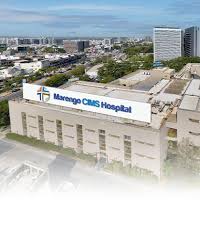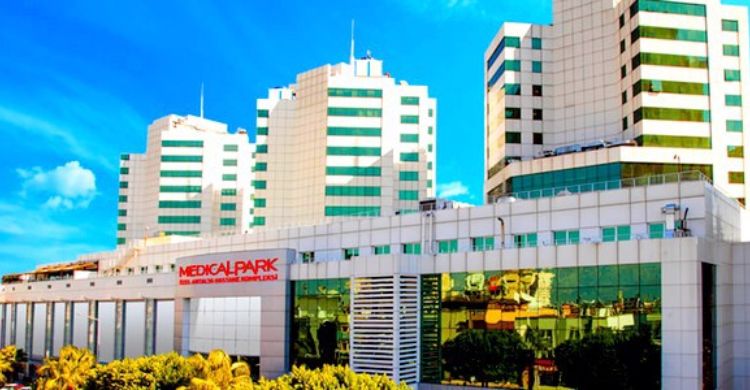Neuro & Brain
Deep Brain Stimulation Treatment
Deep Brain Stimulation
Discover the best deep brain stimulation treatment in India at GetwellGo,
By applying electrical impulses to particular brain regions, a neurosurgical technique called deep brain stimulation (DBS surgery) is used to treat a variety of neurological diseases. DBS surgery is now recognized as a successful therapeutic option in India for conditions such as essential tremors, Parkinson's disease, dystonia, and obsessive-compulsive disorder (OCD).
About DBS Treatment
A neurosurgical technique called deep brain stimulation (DBS) is used to treat the symptoms of a number of neurological conditions. In order to modify neural activity and enhance the quality of life for patients, electrodes are implanted in particular brain regions. The procedure for DBS is usually done under local anaesthesia.
The steps in the technique are as follows:
- Pre-operative assessments: including neurological assessments, MRI, and CT scan.
-
Electrode Implantation
-
Pulse Generator Insertion
-
Post-operative programming
Deep Brain Stimulation for Parkinson’s Disease
One of the most popular applications of this therapy is for Parkinson's disease. Deep Brain Stimulation may be very beneficial for patients with advanced Parkinson's disease who do not respond well to treatment, which could result in: Decreased stiffness, bradykinesia, and tremors in the motor domain. Enhanced capacity for daily living and functioning.
Brain Stimulation Therapy
DBS is one type of brain stimulation therapy, which provides a reversible and customizable therapeutic option for a range of neurological diseases. It can be taken into account for:
- Essential Tremor
-
Dystonia
-
Obsessive – Compulsive Disorder
-
Tourette Syndrome
Need for Deep Brain Stimulation
More and more people are realizing that Deep Brain Stimulation (DBS) is an essential therapeutic option for individuals with a range of neurological and psychiatric conditions. The following are a few main points that emphasize the necessity of DBS surgery:
-
Management of Symptoms of Parkinson’s Disease, Essential tremor and Dystonia
-
Minimizing Side Effects
-
Enhanced daily Functioning
Deep Brain Stimulation Symptoms
Treatment with Deep Brain Stimulation (DBS) may cause a range of symptoms and adverse effects. An outline of the possible symptoms that patients may encounter is provided below:
-
Infection at the surgical site.
-
Discomfort or Pain at the implant site.
-
Patients may experience depression, anxiety, or mood swings.
-
Some patients may report confusion, memory issues, or difficulties with concentration.
-
Patients might experience sensations like tingling, pins and needles, or a feeling of heaviness.
-
Some patients may notice changes in speech.
Risk factors of Deep Brain Stimulation
Although deep brain stimulation (DBS) is widely regarded as a safe and successful treatment for a number of neurological conditions, there are some risks associated with the treatment, just like with any surgery. Below are the possible risks related to DBS surgery:
-
Surgical Risks such as infection, bleeding
-
Device related risks such malfunction of DBS device and displacement or damaged
-
Neurological Risks such as cognitive changes, mood disorders
-
Balance and Coordination Issues
-
Pre-Existing Health Conditions
Causes of Deep Brain Stimulation
The medical issues that prompt physicians to suggest Deep Brain Stimulation surgery (DBS surgery) as a treatment option are referred to as the "causes" for receiving DBS treatment. When a patient's symptoms from neurological or psychiatric illnesses are not well managed by medication or other therapy, DBS surgery is frequently used. The following are the main causes why DBS treatment is required:
-
Parkinson’s Disease
-
Essential Tremor
-
Dystonia
-
Obsessive-Compulsive Disorder
-
Tourette Syndrome
-
Epilepsy
-
Depression
Facilities and Services offered for International Patients for Deep Brain Stimulation
International patients undergoing Deep Brain Stimulation (DBS) treatment can benefit from a range of specialized facilities and services. These include comprehensive medical consultations, advanced surgical facilities, personalized post-operative care and programming, language and cultural support, travel and accommodation assistance, dedicated international patient services, financial services, telemedicine and remote follow-ups, and patient education and support groups.
Process
Pre-treatment for Deep Brain Stimulation
Before DBS can be administered and to determine whether the patient is a good candidate for it as well as the time for the surgery to be conducted there is a series of phases in the pre-treatment process:
- Initial Consultation and Evaluation is a process with medical history examination, internal and neurological check and the medical psychologist examination.
-
Diagnostic testing and imaging comprises MRI, CT scan, and neuro-psychological tests.
-
Complete Medication History.
-
Advance Warning of Risks and Advantages.
-
Patient Educations and Preparation for Post Test Results.
-
Scheduling Surgery.
Diagnostic Tests for Deep Brain Stimulation
Series of tests and assessments to ascertain whether the treatment is appropriate for them:
-
General physical exam
-
Other tests like magnetic resonance imaging (MRI scan), computerized axial tomography scan (CAT scan)
-
Laboratory tests
-
Laboratory tests
-
Cognitive assessment
-
A depressive, anxious or amnesic profile in a neuropsychological test.
-
Psychiatric Evaluation
Deep Brain Stimulation Treatment
Deep brain stimulation (DBS) is a surgical process that involves implanting electrodes in the brain and connecting them to a pulse generator that's implanted under the skin:
-
Brain mapping: In order to find out which areas of the brain shall have electrodes implanted, MRI scan is carried out.
-
Electrode implantation: Before the patient is put under anaesthesia, the surgeon places one or several insulated wires, called leads or electrodes in the brain. The surgeon and medical team therefore follow this by conducting tests to ascertain the positioning of electrodes.
-
Pulse generator implantation: The surgeon then totally inserts the pulse generator, known as the “brain pacemaker or heart pacemaker,” beneath the skin in the chest. These electrodes are connected to pulse generators.
-
Device activation: It is switched on a few weeks after surgery and the patient discusses with his or her healthcare manager to select the most suitable parameters.
Post-treatment for Deep Brain Stimulation
After DBS surgery, patients need across treatment entailing physical therapy, follow-up examinations and further device programming to optimize treatment gain:
-
Patients’ condition within hours after the operation
-
Rest and recovery at home
-
Choose and start device activation of the implanted DBS device
-
Appointment reminder and checking
-
Medications adjustments
-
Treating possible side effects
-
Long Term Device Care
-
Endpoint variation/ Modification: lifestyle alteration and support
-
Long Term Implications and Quality of life
Success Rate of Deep Brain Stimulation
Deep Brain Stimulation (DBS) is an effective method in treating Parkinson’s disease and a variety of other conditions. Thus, in patients with Parkinson’s disease, DBS yields 85 to 89 percent improvement in overall motor proficiency. DBS can very much reduce the extent of the tremor, and other defining symptoms such as slowness and stiffness. However, DBS doesn’t necessarily improve all the symptoms and there can be worsening of thinking problems and increased sadness.
India’s Best Hospitals for Deep Brain Stimulation
-
Medanta – The Medicity, Gurgaon
-
Artemis Hospital, Gurgaon
-
Fortis Memorial Research Institute, Gurgaon
-
Indraprastha Apollo Hospital, New Delhi
-
Max Healthcare, Delhi
-
IBS Hospital, Delhi
India’s Best Doctors for Deep Brain Stimulation
-
Dr. Alok Gupta
-
Dr. C M Malhotra
-
Dr. Mukul Verma
-
Dr. P N Renjen
-
Dr. Pranav Kumar
-
Dr. Varindra Paul Singh
Why choose Get Well Go for Deep Brain Stimulation Treatment in India?
There are several advantages of undergoing Get Well Go for Deep Brain Stimulation (DBS) therapy in India, especially for those patients who come from other counties and patients in India who are in search of the best health care services:
-
Expert Medical Team
-
Navigational Surgical Systems
-
Individualised Treatment Programs
-
Great Quality at Low Cost
-
End to End Support for International Patients
-
Intervention Class Planning
-
Rehabilitation and aftercare are easy.
-
High Patient Satisfaction
Conclusion
DBS surgery follows a recovery process map that entails the early and later stages of recovery. Patients get admitted for 1-2 days and have to follow the doctors due to possible complications. They also should take care of wounds, refrain from lifting heavy objects, and take care of mild pains. Additionally, the DBS device is switched on post 2 to 4 weeks, and patients should attend follow up clinic visits and have further medication changes. Because of this, the device requires frequent calibration to ensure that the symptoms are well managed and at the same time the side effects are kept to a minimum. Battery control is crucial and it is advised that patients’ stay away from magnetic fields and other features or activities that may hinder DBS. Possible changes in relation to sex may be experienced in emotions and body, and the patient must discuss this with their doctor. Physical therapy may be necessary for mobility, coordination, or speech issues. Support systems, such as counseling and support groups, are crucial for patients. To adjust to life with DBS, patients should stay patient, maintain an active lifestyle, monitor symptoms, and embrace support. With proper care, symptom monitoring, and lifestyle adjustments, many patients experience significant improvement in their quality of life.
FAQs
1. How long does recuperation take? What should I anticipate following surgery?
- You can get headaches for up to 48 hours following surgery. Additionally, when the gadget is first programmed, you can experience a tiny tingle or shock. Most patients stay in a hospital from two to three days to a week.
2. What are the dangers of DBS surgery?
- There is a slight chance of infection, hemorrhage, stroke, and seizures, just like with any operation.
3. How long do the benefits last?
- While the effects of DBS differ from patient to patient, essential tremor patients often see a 70–80% reduction in tremor.
4. What impact does DBS have on medications?
- After surgery, the majority of patients are able to decrease or completely cease taking anti-tremor medicines.
TREATMENT-RELATED QUESTIONS
GetWellGo will provide you end-to-end guidance and assistance and that will include finding relevant and the best doctors for you in India.
A relationship manager from GetWellGo will be assigned to you who will prepare your case, share with multiple doctors and hospitals and get back to you with a treatment plan, cost of treatment and other useful information. The relationship manager will take care of all details related to your visit and successful return & recovery.
Yes, if you wish GetWellGo can assist you in getting your appointments fixed with multiple doctors and hospitals, which will assist you in getting the second opinion and will help you in cost comparison as well.
Yes, our professional medical team will help you in getting the estimated cost for the treatment. The cost as you may be aware depends on the medical condition, the choice of treatment, the type of room opted for etc. All your medical history and essential treatment details would be analyzed by the team of experts in the hospitals. They will also provide you with the various types of rooms/accommodation packages available and you have to make the selection. Charges are likely to vary by the type of room you take.
You have to check with your health insurance provider for the details.
The price that you get from GetWellGo is directly from the hospital, it is also discounted and lowest possible in most cases. We help you in getting the best price possible.
No, we don't charge patients for any service or convenience fee. All healthcare services GetWellGo provide are free of cost.
Top Doctors for Neuro & Brain
Top Hospitals for Neuro & Brain
Contact Us Now!
Fill the form below to get in touch with our experts.



%20Joy%20Dev%20Mukherji.jpg)



